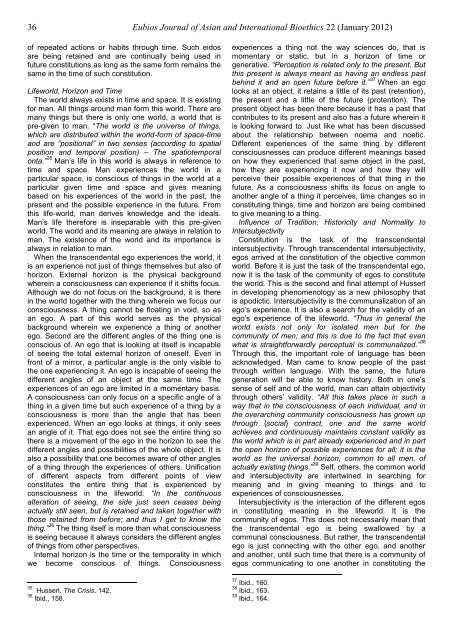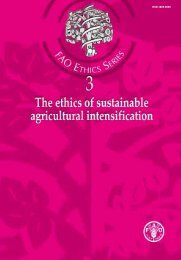Eubios Journal of Asian and International Bioethics - Eubios Ethics ...
Eubios Journal of Asian and International Bioethics - Eubios Ethics ...
Eubios Journal of Asian and International Bioethics - Eubios Ethics ...
Create successful ePaper yourself
Turn your PDF publications into a flip-book with our unique Google optimized e-Paper software.
36 <strong>Eubios</strong> <strong>Journal</strong> <strong>of</strong> <strong>Asian</strong> <strong>and</strong> <strong>International</strong> <strong>Bioethics</strong> 22 (January 2012)<br />
<strong>of</strong> repeated actions or habits through time. Such eidos<br />
are being retained <strong>and</strong> are continually being used in<br />
future constitutions as long as the same form remains the<br />
same in the time <strong>of</strong> such constitution.<br />
Lifeworld, Horizon <strong>and</strong> Time<br />
The world always exists in time <strong>and</strong> space. It is existing<br />
for man. All things around man form this world. There are<br />
many things but there is only one world, a world that is<br />
pre-given to man. “The world is the universe <strong>of</strong> things,<br />
which are distributed within the world-form <strong>of</strong> space-time<br />
<strong>and</strong> are “positional” in two senses (according to spatial<br />
position <strong>and</strong> temporal position) – The spatiotemporal<br />
onta.” 35 Man’s life in this world is always in reference to<br />
time <strong>and</strong> space. Man experiences the world in a<br />
particular space, is conscious <strong>of</strong> things in the world at a<br />
particular given time <strong>and</strong> space <strong>and</strong> gives meaning<br />
based on his experiences <strong>of</strong> the world in the past, the<br />
present <strong>and</strong> the possible experience in the future. From<br />
this life-world, man derives knowledge <strong>and</strong> the ideals.<br />
Man’s life therefore is inseparable with this pre-given<br />
world. The world <strong>and</strong> its meaning are always in relation to<br />
man. The existence <strong>of</strong> the world <strong>and</strong> its importance is<br />
always in relation to man.<br />
When the transcendental ego experiences the world, it<br />
is an experience not just <strong>of</strong> things themselves but also <strong>of</strong><br />
horizon. External horizon is the physical background<br />
wherein a consciousness can experience if it shifts focus.<br />
Although we do not focus on the background, it is there<br />
in the world together with the thing wherein we focus our<br />
consciousness. A thing cannot be floating in void, so as<br />
an ego. A part <strong>of</strong> this world serves as the physical<br />
background wherein we experience a thing or another<br />
ego. Second are the different angles <strong>of</strong> the thing one is<br />
conscious <strong>of</strong>. An ego that is looking at itself is incapable<br />
<strong>of</strong> seeing the total external horizon <strong>of</strong> oneself. Even in<br />
front <strong>of</strong> a mirror, a particular angle is the only visible to<br />
the one experiencing it. An ego is incapable <strong>of</strong> seeing the<br />
different angles <strong>of</strong> an object at the same time. The<br />
experiences <strong>of</strong> an ego are limited in a momentary basis.<br />
A consciousness can only focus on a specific angle <strong>of</strong> a<br />
thing in a given time but such experience <strong>of</strong> a thing by a<br />
consciousness is more than the angle that has been<br />
experienced. When an ego looks at things, it only sees<br />
an angle <strong>of</strong> it. That ego does not see the entire thing so<br />
there is a movement <strong>of</strong> the ego in the horizon to see the<br />
different angles <strong>and</strong> possibilities <strong>of</strong> the whole object. It is<br />
also a possibility that one becomes aware <strong>of</strong> other angles<br />
<strong>of</strong> a thing through the experiences <strong>of</strong> others. Unification<br />
<strong>of</strong> different aspects from different points <strong>of</strong> view<br />
constitutes the entire thing that is experienced by<br />
consciousness in the lifeworld. “In the continuous<br />
alteration <strong>of</strong> seeing, the side just seen ceases being<br />
actually still seen, but is retained <strong>and</strong> taken together with<br />
those retained from before; <strong>and</strong> thus I get to know the<br />
thing.” 36 The thing itself is more than what consciousness<br />
is seeing because it always considers the different angles<br />
<strong>of</strong> things from other perspectives.<br />
Internal horizon is the time or the temporality in which<br />
we become conscious <strong>of</strong> things. Consciousness<br />
35 Husserl, The Crisis, 142.<br />
36 Ibid., 158.<br />
experiences a thing not the way sciences do, that is<br />
momentary or static, but in a horizon <strong>of</strong> time or<br />
generative. “Perception is related only to the present. But<br />
this present is always meant as having an endless past<br />
behind it <strong>and</strong> an open future before it.” 37 When an ego<br />
looks at an object, it retains a little <strong>of</strong> its past (retention),<br />
the present <strong>and</strong> a little <strong>of</strong> the future (protention). The<br />
present object has been there because it has a past that<br />
contributes to its present <strong>and</strong> also has a future wherein it<br />
is looking forward to. Just like what has been discussed<br />
about the relationship between noema <strong>and</strong> noetic.<br />
Different experiences <strong>of</strong> the same thing by different<br />
consciousnesses can produce different meanings based<br />
on how they experienced that same object in the past,<br />
how they are experiencing it now <strong>and</strong> how they will<br />
perceive their possible experiences <strong>of</strong> that thing in the<br />
future. As a consciousness shifts its focus on angle to<br />
another angle <strong>of</strong> a thing it perceives, time changes so in<br />
constituting things, time <strong>and</strong> horizon are being combined<br />
to give meaning to a thing.<br />
Influence <strong>of</strong> Tradition, Historicity <strong>and</strong> Normality to<br />
Intersubjectivity<br />
Constitution is the task <strong>of</strong> the transcendental<br />
intersubjectivity. Through transcendental intersubjectivity,<br />
egos arrived at the constitution <strong>of</strong> the objective common<br />
world. Before it is just the task <strong>of</strong> the transcendental ego,<br />
now it is the task <strong>of</strong> the community <strong>of</strong> egos to constitute<br />
the world. This is the second <strong>and</strong> final attempt <strong>of</strong> Husserl<br />
in developing phenomenology as a new philosophy that<br />
is apodictic. Intersubjectivity is the communalization <strong>of</strong> an<br />
ego’s experience. It is also a search for the validity <strong>of</strong> an<br />
ego’s experience <strong>of</strong> the lifeworld. “Thus in general the<br />
world exists not only for isolated men but for the<br />
community <strong>of</strong> men; <strong>and</strong> this is due to the fact that even<br />
what is straightforwardly perceptual is communalized.” 38<br />
Through this, the important role <strong>of</strong> language has been<br />
acknowledged. Man came to know people <strong>of</strong> the past<br />
through written language. With the same, the future<br />
generation will be able to know history. Both in one’s<br />
sense <strong>of</strong> self <strong>and</strong> <strong>of</strong> the world, man can attain objectivity<br />
through others’ validity. “All this takes place in such a<br />
way that in the consciousness <strong>of</strong> each individual, <strong>and</strong> in<br />
the overarching community consciousness has grown up<br />
through {social} contract, one <strong>and</strong> the same world<br />
achieves <strong>and</strong> continuously maintains constant validity as<br />
the world which is in part already experienced <strong>and</strong> in part<br />
the open horizon <strong>of</strong> possible experiences for all; it is the<br />
world as the universal horizon, common to all men, <strong>of</strong><br />
actually existing things.” 39 Self, others, the common world<br />
<strong>and</strong> intersubjectivity are intertwined in searching for<br />
meaning <strong>and</strong> in giving meaning to things <strong>and</strong> to<br />
experiences <strong>of</strong> consciousnesses.<br />
Intersubjectivity is the interaction <strong>of</strong> the different egos<br />
in constituting meaning in the lifeworld. It is the<br />
community <strong>of</strong> egos. This does not necessarily mean that<br />
the transcendental ego is being swallowed by a<br />
communal consciousness. But rather, the transcendental<br />
ego is just connecting with the other ego, <strong>and</strong> another<br />
<strong>and</strong> another, until such time that there is a community <strong>of</strong><br />
egos communicating to one another in constituting the<br />
37 Ibid., 160.<br />
38 Ibid., 163.<br />
39 Ibid., 164.

















